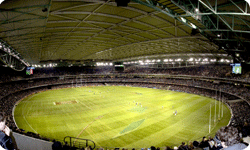Freedom of speech at sporting events
 Andrew Vincent
Andrew Vincent
With flagship events like the Melbourne Cup and the Formula 1 Grand Prix, Victoria has long been regarded as the premier state for major sporting events. In order to cement that position, the Brumby Government has introduced the Major Sporting Events Bill 2009.
The Bill consolidates a number of existing enactments relating to major sporting events and introduces a range of measures for events where the Governor-in-Council has made a ‘major sporting event order’.
The Bill is a welcome change in many respects. It consolidates and improves an otherwise messy regulatory regime and comprehensively sets out the law relating to major sporting events. Conversely certain measures in the Bill risk imposing unreasonable restrictions on our civil liberties.
For instance, the Bill makes it an offence for a person to possess a ‘prohibited item’ at an event venue, which includes a flag or banner larger than one square metre or with a handle longer than one metre. Given that many items of that description may not actually cause an unreasonable disruption to the event or spectators, this blanket prohibition operates to unreasonably infringe freedom of expression.
Further, the prohibition is completely unnecessary. In the event that a large flag or banner does cause a disruption, other powers under the Bill could be employed, such as the power to expel any person who causes an unreasonable disruption.
Curiously, the Bill also includes ‘bicycles’ in the definition of ‘prohibited item’. In certain circumstances, this could unreasonably restrict freedom of movement. For example, where an ‘event area’ includes the area surrounding a sporting venue, it would be an offence to ride a bicycle in that surrounding area. Therefore, it is possible that the Bill could outlaw someone from riding their bike in the park surrounding the MCG.
Another section of the Bill prohibits unauthorised ‘advertising material’ to be placed on any building or structure in an event venue. This serves the laudable purpose of preventing unauthorised and opportunistic commercial advertising. However, the Bill defines ‘advertising’ in excessively broad terms, and would also operate to outlaw many statements relating to goods and services that have a political motive. For instance, the Bill would prohibit a sign protesting against the export of sheep or the cruel treatment of chicken used by KFC.
Although the Bill is commendable for its comprehensive statement of the law relating to major sporting events, the Brumby Government ought to remedy these shortcomings. Just as major sporting events form a key aspect of Victorian culture, they are also important public theatres for the exercise of civil liberties.
Andrew Vincent is a volunteer for Liberty Victoria.
